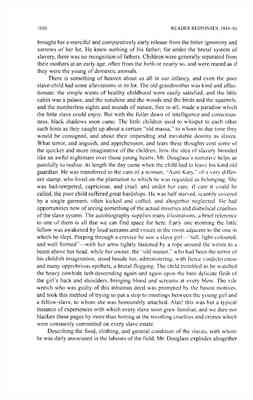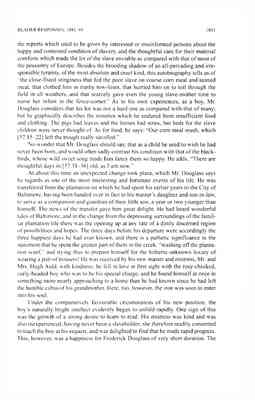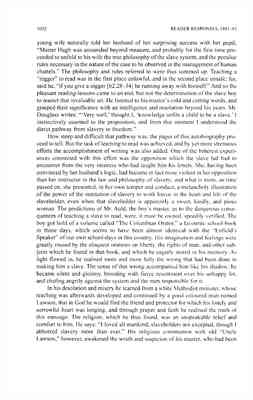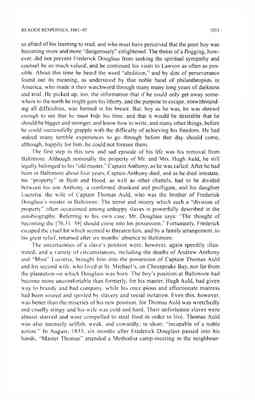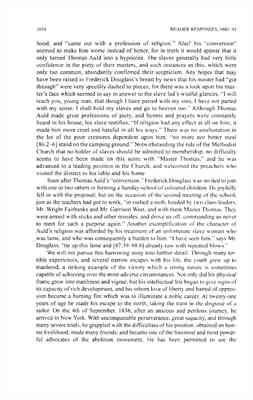Pages
6
1050 READER RESPONSES, 1881–93
brought her a merciful and comparatively early release from the bitter ignominy and sorrows of her lot. He knew nothing of his father; for under the brutal system of slavery, there was no recognition of fathers. Children were generally separated from their mothers at an early age, often from the birth or nearly so, and were reared as if they were the young of domestic animals.
There is something of heaven about us all in our infancy, and even the poor slave-child had some alleviations in its lot. The old grandmother was kind and affectionate; the simple wants of healthy childhood were easily satisfied, and the little cabin was a palace, and the sunshine and the woods and the birds and the squirrels, and the numberless sights and sounds of nature, free to all, made a paradise which the little slave could enjoy. But with the fuller dawn of intelligence and consciousness, black shadows soon came. The little children used to whisper to each other such hints as they caught up about a certain "old massa," to whom in due time they would be consigned, and about their impending and inevitable destiny as slaves. What terror, and anguish. and apprehension, and tears these thoughts cost some of the quicker and more imaginative of the children; how the idea of slavery brooded like an awful nightmare over those young hearts; Mr. Douglass's narrative helps us painfully to realise. At length the day came when the child had to leave his kind old guardian. He was transferred to the care of a woman, "Aunt Katy," of a very different stamp, who lived on the plantation to which he was regarded as belonging. She was bad-tempered, capricious, and cruel, and under her care, if care it could be called, the poor child suffered great hardships. He was half starved, scantily covered by a single garment, often kicked and cuffed, and altogether neglected. He had opportunities now of seeing something of the actual miseries and diabolical cruelties of the slave system. The autobiography supplies many illustrations; a brief reference to one of them is all that we can find space for here. Early one morning the little fellow was awakened by loud screams and voices in the room adjacent to the one in which he slept. Peeping through a crevice he saw a slave girl—"tall, light-coloured, and well formed"—with her arms tightly fastened by a rope around the wrists to a beam above her head, while her owner, the "old master," who had been the terror of his childish imagination, stood beside her, administering, with fierce vindictiveness and many opprobrious epithets, a brutal flogging. The child trembled as he watched the heavy cowhide lash descending again and again upon the bare delicate flesh of the girl's back and shoulders, bringing blood and screams at every blow. The vile wretch who was guilty of this inhuman deed was prompted by the basest motives. and took this method of trying to put a stop to meetings between the young girl and a fellow-slave, to whom she was honourably attached. Alas! this was but a typical instance of experiences with which every slave soon grew familiar, and we dare not blacken these pages by more than hinting at the revolting cruelties and crimes which were constantly committed on every slave estate.
Describing the food, clothing, and general condition of the slaves, with whom he was daily associated in the labours of the field, Mr. Douglass explodes altogether
7
READER RESPONSES, 1881-93 1051
the reports which used to be given by interested or misinformed persons about the happy and contented condition of slavery, and the thoughtful care for their material comforts which made the lot of the slave enviable as compared with that of most of the peasantry of Europe. Besides the brooding shadow of an all-pervading and irresponsible tyranny, of the most absolute and cruel kind, this autobiography tells us of "the close-fisted stinginess that fed the poor slave on coarse corn meal and tainted meat, that clothed him in trashy tow-linen, that hurried him on to toil through the field in all weathers, and that scarcely gave even the young slave-mother time to nurse her infant in the fence-corner." As to his own experiences, as a boy, Mr. Douglass considers that his lot was not a hard one as compared with that of many; but he graphically describes the miseries which he endured from insufficient food and clothing. The pigs had leaves and the horses had straw, but beds for the slave children were never thought of. As for food, he says: "Our corn meal mush, which [57.15–22] left the trough really satisfied."
No wonder that Mr. Douglass should say, that as a child he used to wish he had never been born, and would often sadly contrast his condition with that of the blackbirds, whose wild sweet song made him fancy them so happy. He adds, "There are thoughtful days in [57.31–36] old, as I am now."
At about this time an unexpected change took place, which Mr. Douglass says he regards as one of the most interesting and fortunate events of his life. He was transferred from the plantation on which he had spent his earlier years to the City of Baltimore, having been handed over in fact to his master's daughter and son-in-law, to serve as a companion and guardian of their little son, a year or two younger than himself. The news of the transfer gave him great delight. He had heard wonderful tales of Baltimore, and in the change from the depressing surroundings of the familiar plantation-life then; was the opening up at any rate of a dimly discerned region of possibilities and hopes. The three days before his departure were accordingly the three happiest days he had ever known, and there is a pathetic significance in the statement that he spent the greater part of them in the creek, "washing off the plantation scurf," and trying thus to prepare himself for the hitherto unknown luxury of wearing a pair of trousers! He was received by his new master and mistress, Mr. and Mrs. Hugh Auld, with kindness; he fell in love at first sight with the rosy-cheeked, curly-headed boy who was to he his special charge; and he found himself at once in something more nearly approachmg to a home than he had known since he had left the humble cabin of his grandmother. Here. too, however, the iron was soon to enter into his soul.
Under the comparatively favourable circumstances of his new position, the boy's naturally bright intellect evidently began to unfold rapidly. One sign of this was the growth of a strong desire to learn to read. His mistress was kind and was also inexperienced, having never been a slaveholder; she therefore readily consented to teach the boy at his request, and was delighted to find that he made rapid progress. This, however, was a happiness for Frederick Douglass of very short duration. The
8
1052 READER RESPONSES, 1881 - 93
young wife naturally told her husband of her surprising success with her pupil; "Master Hugh was astounded beyond measure. and probably for the first time proceeded to unfold to his wife the true philosophy of the slave system, and the peculiar rules necessary in the nature of the case to be observed in the management of human chattels." The philosophy and rules referred to were thus summed up. Teaching a "nigger" to read was in the first place unlawful, and in the second place unsafe; for, said he, "if you give a nigger [62.28–34] be running away with himself." And so the pleasant reading-lessons came to an end, but not the determination of the slave boy to master that invaluable art. He listened to his master 's cold and cutting words, and grasped their significance with an intelligence and resolution beyond his years. Mr. Douglass writes: "'Very well,' thought I, 'knowledge unfits a child to be a slave. I instinctively assented to the proposition, and from that moment I understood the direct pathway from slavery to freedom."
How steep and difficult that pathway was, the pages of this aulobiography proceed to tell. But the task of learning to read was achieved, and by yet more strenuous efforts the accomplishment of writing was also added. One of the bitterest experiences connected with this effort was the opposition which the slave lad had to encounter from the very mistress who had taught him his letters. She, having been convinced by her husband's logic, had become in fact more violent in her opposition than her instructor in the law and philosophy of slavery; and what is more, as time passed on, she presented, in her own temper and conduct, a melancholy illustration of the power of the institution of slavery to work havoc in the heart and life of the slaveholder, even when that slaveholder is apparently a sweet, kindly, and pious woman. The predictions of Mr. Auld, the boy's master, as to the dangerous consequences of teaching a slave to read, were, it must he owned, speedily verified. The boy got hold of a volume called "The Columbian Orator," a favourite school-book in those days, which seems to have been almost identical with the "Enfield's Speaker" of our own school-days in this country. His imagination and feelings were greatly roused by the eloquent orations on liberty, the rights of man, and other subjects which he found in that book, and which he eagerly stored in his memory. As light flowed in, he realised more and more fully the wrong that had been done in making him a slave. The sense of that wrong accompanied him like his shadow; he became silent and gloomy, brooding with fierce resentment over his unhappy lot, and chafing angrily against the system and the men responsible for it.
In his desolation and misery he learned from a white Methodist minister, whose teaching was afterwards developed and continued by a good coloured man named Lawson, that in God he would find the friend and protector for which his lonely and sorrowful heart was longing, and through prayer and faith he realised the truth of this message. The religion, which he thus found, was an unspeakable relief and comfort to him. He says: "I loved all mankind, slaveholders not excepted, though I abhorred slavery more than ever." His religious communion with old "Uncle Lawson," however, awakened the wrath and suspicion of his master, who had been
9
READER RESPONSES, 1881-93 1053
so afraid of his learning to read, and who must have perceived that the poor boy was becoming more and more "dangerously" enlightened. The threat of a flogging, however, did not prevent Frederick Douglass from seeking the spiritual sympathy and counsel he so much valued, and he continued his visits to Lawson as often as possible. About this time he heard the word "abolition," and by dint of perseverance found out its meaning, as understood by that noble band of philanthropists in America, who made it their watchword through many many long years of darkness and trial. He picked up, too, the information that if he could only get away somewhere to the north he might gain his liberty, and the purpose to escape, notwithstanding all difficulties, was formed in his breast. But, boy as he was, he was shrewd enough to see that he must bide his time, and that it would be desirable that he should be bigger and stronger, and know how to write, and many other things, before he could successfully grapple with the difficulty of achieving his freedom. He had indeed many terrible experiences to go through before that day should come, although, happily for him, he could not foresee them.
The first step in this new and sad episode of his life was his removal from Baltimore. Although nominally the property of Mr. and Mrs. Hugh Auld, he still legally belonged to his "old master," Captain Anthony, as he was called. After he had been in Baltimore about four years, Captain Anthony died, and as he died intestate, his "property" in flesh and blood, as well as other chattels, had to be divided between his son Anthony, a confirmed drunkard and profligate, and his daughter Lucretia, the wife of Captain Thomas Auld, who was the brother of Frederick Douglass's master in Baltimore. The terror and misery which such a "division of property" often occasioned among unhappy slaves is powerfully described in the autobiography. Referring to his own case, Mr. Douglass says: "The thought of becoming the [76.31-39] should come into his possession." Fortunately, Frederick escaped the cruel lot which seemed to threaten him, and by a family arrangement, to his great relief, returned after six months' absence to Baltimore.
The uncertainties of a slave's position were. however, again speedily illustrated: and a variety of circumstances, including the deaths of Andrew Anthony and "Miss" Lucretia, brought him into the possession of Captain Thomas Auld and his second wife, who lived at St. Michael's on Chesapeake Bay, not far from the plantation on which Douglass was born. The boy's position at Baltimore had become more uncomfortable than formerly, for his master, Hugh Auld, had given way to brandy and had company, while his once pious and affectionate mistress had been soured and spoiled by slavery and social isolation. Even this, however, was better than the miseries of his new position, for Thomas Auld was wretchedly and cruelly stingy and his wife was cold and hard. Their unfortunate slaves were almost starved and were compelled to steal food in order to live. Thomas Auld was also intensely selfish, weak, and cowardly: in short, "incapable of a noble action." In August, 1833, six months after Frederick Douglass passed into his hands, "Master Thomas" attended a Methodist camp-meeting in the neighbour-
10
1054 READER RESPONSES, 1881-93
hood, and "came out with a profession of religion." Alas! his "conversion" seemed to make him worse instead of better, for in truth it would appear that it only turned Thomas Auld into a hypocrite. The slaves generally had very little confidence in the piety of their masters, and such instances as this, which were only too common, abundantly confirmed their scepticism. Any hopes that may have been raised in Frederick Douglass's breast by news that his master had "got through" were very speedily dashed to pieces: for there was a look upon his master's face which seemed to say in answer to the slave lad's wistful glances. "I will teach you, young man, that though I have parted with my sins, I have not parted with my sense. I shall hold my slaves and go to heaven too." Although Thomas Auld made great professions of piety, and hymns and prayers were constantly heard in his house, his slave testifies. "If religion had any effect at all on him, it made him more cruel and hateful in all his ways." There was no amelioration in the lot of the poor creatures dependent upon him: "no more nor better meal [86.2-6] stand on the camping ground." Notwithstanding the rule of the Methodist Church that no holder of slaves should be admitted to memhership, no difficulty seems to have been made on this score with "Master Thomas," and he was advanced to a leading position in the Church, and welcomed the preachers who visited the district to his table and his home.
Soon after Thomas Auld's "conversion," Frederick Douglass was invited to join with one or two others in forming a Sunday-school of coloured children. He joyfully fell in with the proposal; but on the occasion of the second meeting of the school, just as the teachers had got to work, "in rushed a mob, headed by two class-leaders, Mr. Wright Fairbanks and Mr. Garrison West, and with them Master Thomas. They were armed with sticks and other missiles, and drove us off, commanding us never to meet for such a purpose again." Another exemplification of the character of Auld's religion was afforded hy his treatment of an unfortunate slave woman who was lame, and who was consequently a burden to him. "I have seen him," says Mr. Douglass, "tie up this lame and [87.39- 88.8] already raw with repeated blows."
We will not pursue this harrowing story into further detail. Through many terrible experiences, and several narrow escapes with his life, the youth grew up to manhood, a striking example of the victory which a strong nature is sometimes capable of achieving over the most adverse circumstances. Not only did his physical frame grow into manliness and vigour, but his intellectual life began to give signs of its capacity of rich development, and his inborn love of liberty and hatred of oppression became a burning fire which was to illuminate a noble career. At twenty-one years of age he made his escape to the north, taking the train in the disguise of a sailor. On the 4th of September, 1838, after an anxious and perilous journey, he arrived in New York. With unconquerable perseverance, great sagacity, and through many severe trials, he grappled with the diflicultics of his position, obtained an honest livelihood, made many friends, and became one of the foremost and most powerful advocates of the abolition movement. He has been permitted to see the
